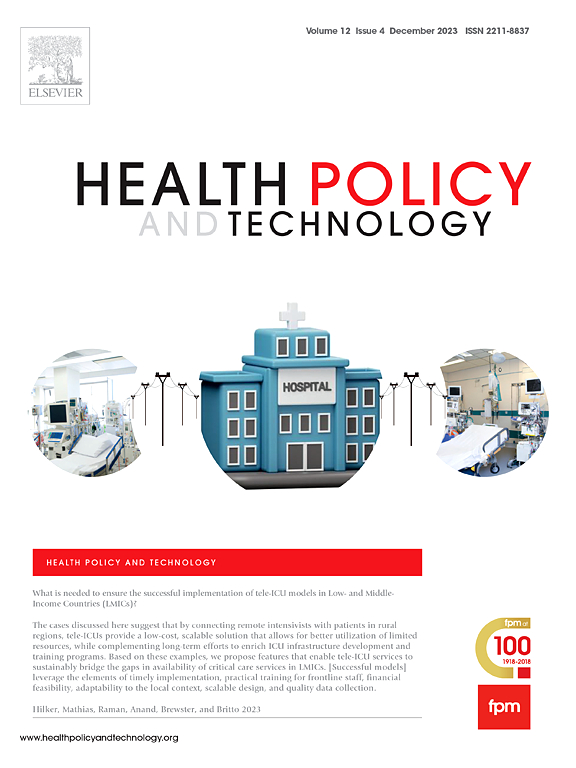指导利益相关者参与医疗器械卫生技术评估:澄清利益相关者角色和贡献的新方法
IF 3.7
3区 医学
Q1 HEALTH POLICY & SERVICES
引用次数: 0
摘要
利益相关者的参与在卫生技术评估(HTA)中被认为是必不可少的,但参与仍然不足,特别是在医疗器械(MD)评估中。关于如何系统地识别和整合利益相关者的文献仍然很少。本研究提出了一个反思性框架,以支持HTA从业者思考利益相关者的包容,并将其应用于探索葡萄牙医疗器械背景下的观点。方法我们采用了Ulrich的关键系统启发式(CSH)作为概念透镜来构建对MD HTA中利益相关者角色和贡献的反思。该框架围绕四个影响来源(动机、控制、知识和合法性)进行组织,并通过对来自葡萄牙HTA机构、医院、患者协会和行业的专家进行26次半结构化访谈来实施。使用定向内容分析和框架方法分析访谈数据,允许在每个影响来源内对比当前(“是”)和理想(“应该”)观点。然后使用共同主题来构建解释性叙述,以捕获利益相关者包容的基本原理。结果该框架的应用揭示了在MD评估中利益相关者参与的具体情况。研究结果表明,利益相关者在MD评估中的作用超出了传统的分类。对于每一个CSH的影响来源,确定了利益相关者参与的理由和条件。在激励下,利益相关者确定了不同的目标和成功措施,从改善患者获得创新的机会到全系统资源优化。在控制下,提供者、购买者和支付者被视为中心决策者,然而理想的过程包括多学科治理和更清晰的程序支持。在知识方面,多个行为者(包括患者)被视为情境专业知识的贡献者,但方法工具方面的差距突出。在合法性下,患者和公众的代表不足,并呼吁建立更强有力的直接参与机制和更广泛的社会协调。在所有影响来源中,发现当前做法与利益攸关方强调发展领域的期望之间存在重大差距。建议的反思框架没有规定固定的参与程序,而是提供了一个结构化的视角,以支持HTA从业者通过利益相关者在MD评估中的角色、价值观和贡献进行推理。该框架可转移到其他决策环境,并促进更加透明和包容的审议。本文章由计算机程序翻译,如有差异,请以英文原文为准。
Guiding stakeholder involvement in health technology assessment for medical devices: A novel approach for clarifying stakeholders’ roles and contributions
Objectives
Stakeholder involvement is recognized as essential in Health Technology Assessment (HTA), yet engagement remains insufficient, particularly in medical device (MD) evaluations. Literature on how to systematically identify and integrate stakeholders remains scarce. This study proposes a reflective framework to support HTA practitioners think about stakeholder inclusion and applies it to explore perspectives within the medical device context in Portugal.
Methods
We adapted Ulrich’s Critical Systems Heuristics (CSH) as a conceptual lens to structure reflection on stakeholder roles and contributions in MD HTA. The framework is organized around four sources of influence (motivation, control, knowledge, and legitimacy) and was operationalized through 26 semi-structured interviews with experts from Portugal’s HTA agency, hospitals, patient associations, and industry. Interview data were analysed using directed content analysis and the Framework Method, allowing to contrast current ('is') and ideal ('ought') views within each source of influence. The common themes were then used to construct interpretative narratives that captured rationales for stakeholder inclusion.
Results
The application of the framework revealed context-specific insights into stakeholder engagement in MD evaluation. Findings show stakeholder roles in MD evaluations extend beyond traditional classifications. For each CSH source of influence, rationales and conditions for stakeholder engagement were identified. Under motivation, stakeholders identified diverse purposes and measures of success, ranging from improved patient access to innovation to system-wide resource optimization. Under control, providers, purchasers, and payers were seen as central decision-makers, yet ideal processes included multidisciplinary governance and clearer procedural support. Under knowledge, multiple actors (including patients) were valued as contributors of contextual expertise, but gaps were highlighted in methodological tools. Under legitimacy, patients and the public were underrepresented and called for stronger mechanisms for direct involvement and broader societal alignment. Across all sources of influence, significant gaps were found between current practices and stakeholder expectations to highlight areas for development.
Conclusions
Rather than prescribing fixed engagement procedures, the proposed reflective framework offers a structured lens to support HTA practitioners in reasoning through stakeholder roles, values, and contributions in MD evaluations. The framework is transferable to other decision-making contexts and fosters more transparent and inclusive deliberation.
求助全文
通过发布文献求助,成功后即可免费获取论文全文。
去求助
来源期刊

Health Policy and Technology
Medicine-Health Policy
CiteScore
9.20
自引率
3.30%
发文量
78
审稿时长
88 days
期刊介绍:
Health Policy and Technology (HPT), is the official journal of the Fellowship of Postgraduate Medicine (FPM), a cross-disciplinary journal, which focuses on past, present and future health policy and the role of technology in clinical and non-clinical national and international health environments.
HPT provides a further excellent way for the FPM to continue to make important national and international contributions to development of policy and practice within medicine and related disciplines. The aim of HPT is to publish relevant, timely and accessible articles and commentaries to support policy-makers, health professionals, health technology providers, patient groups and academia interested in health policy and technology.
Topics covered by HPT will include:
- Health technology, including drug discovery, diagnostics, medicines, devices, therapeutic delivery and eHealth systems
- Cross-national comparisons on health policy using evidence-based approaches
- National studies on health policy to determine the outcomes of technology-driven initiatives
- Cross-border eHealth including health tourism
- The digital divide in mobility, access and affordability of healthcare
- Health technology assessment (HTA) methods and tools for evaluating the effectiveness of clinical and non-clinical health technologies
- Health and eHealth indicators and benchmarks (measure/metrics) for understanding the adoption and diffusion of health technologies
- Health and eHealth models and frameworks to support policy-makers and other stakeholders in decision-making
- Stakeholder engagement with health technologies (clinical and patient/citizen buy-in)
- Regulation and health economics
 求助内容:
求助内容: 应助结果提醒方式:
应助结果提醒方式:


